The mayoral succession to Willie Herenton, the dominant figure in
Memphis city politics for the better part of two decades, is now
beginning to resemble the situation in Yugoslavia in the early ’90s
after the death of that country’s longtime dictator, Marshal Tito.
Not only did rivals of every sort begin staking their claims to
power, but the country itself broke up into fragments — Serbia,
Bosnia, Croatia, Kosovo, etc. — and the process continues even
today. Nobody expects that kind of balkanization to occur in Memphis.
The city is the city and will remain so.
But the power struggle is something else. For years, ever since it
became obvious that Herenton wanted to take leave of the mayor’s
office, Shelby County mayor A C Wharton has been reckoned the odds-on
favorite to succeed him. Even now, the major challenge to that
assumption has come from Wharton’s own expression of concern about the
size of the prospective October 27th special election field two weeks
ago.
Wharton worried out loud that a plethora of niche candidates could
create a “fluke” situation with an unexpected victor. And a day after
he formally left office last Thursday, leaving City Council chairman
Myron Lowery in charge as “mayor pro tem,” Herenton, too, advanced the
notion that the special election would be a “crapshoot,” one which
“anybody can win.”
The “anybody” in question at the time was a relatively small field
consisting of Wharton, Lowery, former City Council member Carol
Chumney, lawyer and Herenton intimate Charles Carpenter, WWE
wrestler/commentator Jerry Lawler, maverick school board member the
Rev. Kenneth Whalum Jr., and businessman/Shelby County commissioner
James Harvey. Lawyer Jim Strickland, who had been considered a strong
contender, decided against running after commissioning and digesting a
poll.
Lowery, whose early wish to have an orderly transition and to head
up an activist interim government was quashed by Herenton, was reeling
anew this week after his post-swearing-in effort to fire City attorney
Elbert Jefferson angered fellow council members and was blocked, at
least temporarily, by a judicial injunction.
Coincidentally or not, that imbroglio coincided with a second wave
of mayoral candidates, including, it would seem, City Court clerk
Thomas Long, City Council member Wanda Halbert, and former City Council
member Edmund Ford Sr. Nor, with ample time left before the September
17th filing date for candidacies, is there reason to believe that the
parade of new hopefuls is over.
Clearly, there is a power vacuum in Memphis at the moment, and the
fact that nature abhors a vacuum is a bona fide physical law that
applies to politics as well. The present confusion in the city’s
political ranks is a case in point.
Who’s on first? Almost every evaluation of the race, by
disinterested observers, as well as several highly interested
candidates and prospects themselves, presupposes that Wharton is. The
county mayor’s financial war chest already is estimated between
$250,000 and $500,000. He began running for city mayor in mid-2008 and
was regarded as Herenton’s heir apparent long before that.
And, although Strickland isn’t saying for the record, it is assumed
that the upwardly mobile councilman shelved his ambition, at least for
the current year, because the poll he recently commissioned showed
Wharton to be so far ahead that no one else had a theoretical chance of
catching him — not at least within the somewhat-less-than-90-day
period remaining before election-day votes are cast on October
27th.
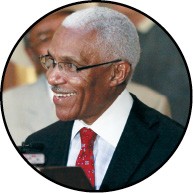 justin fox burks
justin fox burks
A C Wharton
(And, hark! In a radio interview this week, interim mayor Lowery
contended, on what specific basis he did not share, that the Shelby
County Election Commission’s posted election date will be moved up,
“maybe to October 15th,” in accordance with a provision of state law
that trumps the city charter. See Politics, page 14.)
At least two mayoral contenders are convinced, however, that former
Councilwoman Chumney, the second-place finisher to Herenton in 2007
with 32 percent of the vote, is in the lead. One of those contenders is
Chumney herself, who — in the face of widespread skepticism
elsewhere — has never failed in her public statements to put
herself forward as the candidate for change. That mantle clearly
devolved on her two years ago, however, when a third hopeful in the
mayor’s race, former Memphis Light, Gas & Water head Herman Morris,
failed to get his relatively well-financed campaign in high gear.
Chumney’s belief in her prospects is to be expected. More surprising
is the conviction expressed this week by candidate Harvey that Chumney,
who got a modicum of bounce recently by helping provide emergency
supplies to victims of the recent tornado, is in the lead. Harvey’s
theory is that the ratio of serious black candidates to serious white
candidates has reached a level prohibitive to the former and that
Chumney, as the only credible white candidate in the race thus far,
will profit from the split.
It should be noted that council member Halbert specifically debunked
the “too-many-blacks” theory when she announced her own candidacy in
front of City Hall on Monday. “The voters will make that decision,” she
insisted.
Harvey’s theory presupposes two things: First, that no other major
white candidate will enter the race, and, though Councilman Kemp Conrad
has apparently stopped indulging in the daily consultations with
potential supporters that were his habit a month ago, he hasn’t
formally opted out of the race; and second, that candidate Lawler is
not serious, something that the self-professed “anti-politician,” who
first ran in the multi-candidate race of 1999, contests vigorously. So
does Herenton, who recalled respectfully last week that Lawler “got a
substantial number of votes.” Lawler finished with 12 percent, though
his WWE commitments at the time never allowed him to campaign more than
one or two days a week. Lawler promises at least a six-day-a-week
effort this year, though Lowery, for one, isn’t concerned.
The mayor pro tem professes to see Lawler’s very campaign as a
“stunt” and countered with a stunt of his own in his radio interview,
playfully challenging Lawler to a wrestling match (though the heavy-set
Lowery did not specify whether WWE or Sumo rules would apply).
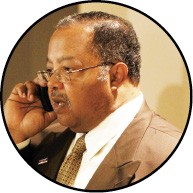 justin fox burks
justin fox burks
Myron Lowery
Carpenter, the municipal-finance specialist who managed all of
Herenton’s election campaigns and worked closely with the ex-mayor on a
number of projects — notably the controversial FedExForum deal
— is an unknown quantity in the race. Presumably capable of
raising campaign cash and presumably able to call on Herenton’s
residual political network, Carpenter has so far tried to walk a
tightrope, distancing himself from his past involvements and insisting
that he’s his own man while presuming he has the advantage of his
associations, too.
And then there’s Whalum, another unknown quantity. Although new
mayoral entry Long may be trying to give the colorful Olivet Baptist
Church minister some competition on the pizzazz front — the
relatively staid city clerk is holding a “line-dancing and bid whist”
fund-raiser every Wednesday evening at Classic Hitz on Brooks Road
— Whalum is generally regarded as the best in show as far as pure
entertainment value goes. He dazzled members of the Associated Builders
and Contractors at an ABC mayoral forum last month with his flamboyance
and preacher-inflected straight talk, though it was doubtful that, even
with his standing four-square against consolidation, he garnered any
votes from that conservative-minded bunch.
(This characterization and this estimate are sure to be contested by
Whalum, who is also skilled and tireless at conducting online guerrilla
warfare, sending out a torrent of e-mails on campaign themes to almost
anyone connected with city politics and commenting freely on
politically tinged blogs.)
Again, most estimates of what is to come for city government imagine
that A C Wharton looms largest in the burgeoning mayoral field,
overshadowing all others, the central figure right now being Mayor Pro
Tem Lowery. Lowery has been a presence in the public life of Memphis
for more than 30 years, including several years spent as a reporter and
weekend anchor at WMC-TV, Action News 5. As Lowery, first elected to
the council in that watershed year of 1991 (on his third try), pointed
out this week concerning his service on the council, “I’ve been here
for the same length of time as former Mayor Herenton, even longer.”
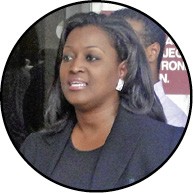 jackson baker
jackson baker
Wanda Halbert
Despite that, and the fact that Lowery has in the past year served
not only as council chairman (he relinquished that position to
Councilman Harold Collins upon becoming interim mayor) but as chairman
of the Memphis Charter Commission, as well, results leaked from a poll
or two performed for other candidates show him merely blipping the
radar screen somewhere in the single digits.
Whether that’s an accurate barometer or not, the reality of Lowery’s
position is that, unlike all other candidates, he has an opportunity to
show what he can do as the city’s chief executive, rather than merely
talking about it.
Assertive by nature (anyone who has observed his chairmanship of the
council, especially during the intense budget sessions of the late
spring, knows he can be forceful and abrasive), Lowery is compelled
toward a pro-active mayorship by electoral necessity, as well.
Hence the rhetoric of his swearing-in last week and his assertion of
an agenda then and since. For the third time in little more than a
month, the city’s Hall of Mayors last Friday became the scene of
interaction between Herenton and Lowery — the former as mayor of
Memphis on every occasion except Friday’s, when he was a courtesy
speaker at Lowery’s swearing-in.
The two previous occasions had been something of a Mutt and Jeff
show, with the towering, self-confident Herenton dominating the
proceedings.
 justin fox burks
justin fox burks
Carol Chumney
That was understandably so on June 25th when Herenton made the
bombshell announcement that he would be resigning his office. On that
date Lowery made the ill-fated — and perhaps ill-considered
— decision to assume the podium immediately after Herenton. That
move was a prelude to some take-charge actions which ultimately proved
premature, especially as Herenton made it clear he intended to spike
them right away, even if he had to postpone his original July 10th
departure date by three additional weeks.
The second occasion was last Thursday’s retirement ceremony, at the
very end of which Herenton deigned to hold out to a chastened and
patient Lowery the formal letter of resignation, which finally entitled
Lowery as current City Council chair to assume the mayoralty until the
selection of a new city chief executive on October 27th.
The element of condescension was not entirely absent from Herenton’s
behavior the next day. In a brief interview with the media before
Lowery’s formal swearing-in, the ex-mayor seemed to be commenting on
what turned out to be major personnel changes made by Lowery when he
noted that, on his own ascension to power in 1992, “I kept the vast
majority of the former mayor’s staff because they were knowledgeable
and dedicated, and I needed a period of time in which I could learn the
government.” He continued, “It behooves any individual with a major
leadership role to have some continuity and make sure the government
works.”
Once at the podium, Herenton was brief and gracious, though with a
touch of ambiguity, noting the presence of his own predecessor, former
Mayor Dick Hackett, and continuing, “I congratulate Mayor Pro Tem Myron
Lowery for his acceptance of this highly responsible position. … I
feel certain that Mayor Pro Tem Lowery, with the men and women that
will accompany him, that the government will continue to work.” Then,
with a quick wish of “godspeed,” Herenton departed the podium.
It was at this point that Lowery was officially sworn in by U.S.
district judge Hardy S. Mays.
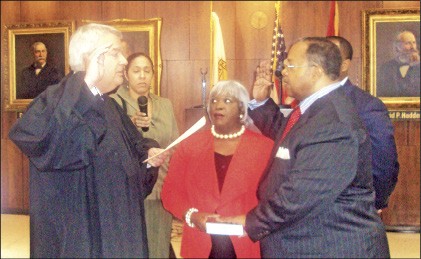 jackson baker
jackson baker
Interim mayor Myron Lowery, right, and Jack Sammons, his new CAO
Once he began his own brief remarks, Lowery sounded resolute and
determined to put his own stamp on the occasion and, for that matter,
demonstrated that he was no slouch at ambiguity himself.
“It’s a new day in City Hall,” he said, reminding his audience that
“change is a good thing, ” and “new life and new individuals” bring
“hope and promise.” He promised “to promote ethical leadership in
government” and to “tell the truth” (especially about financial
matters). Matters that had lagged, such as those involving The Pyramid,
the Fairgrounds, and Beale Street, would be expedited.
Lowery summed up: “What you will get from Myron Lowery will be good
government.”
In a brief press conference after the swearing-in ceremony, Lowery
was even more assertive, letting the media know that he had asked for
the resignation of city attorney
Elbert Jefferson and that he would review what he indicated was a
suspicious number of new hires in the city’s legal department. No
further changes in personnel were planned for the moment, he said, but
he made it clear he intended to monitor the activities of department
heads. He introduced former Councilman Jack Sammons as his CAO and
former U.S. attorney Veronica Coleman Davis as Jefferson’s
replacement.
Only, the problem was that the new mayor, satisfied that, as he put
it, “I have the power” and determined to conduct himself vigorously
enough to cancel out such qualifiers as “pro tem” (a term pointedly
favored by the outgoing mayor), was nevertheless confronted with a
staunch resistance on the council.
Much of this was the residue of several council votes taken in the
preceding month to expedite the special election. Lowery had sided with
the council’s six whites on those votes, while the six black members,
supportive more or less of Herenton’s dilatory tactics, had formed a
bloc of their own.
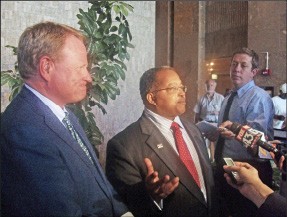 jackson baker
jackson baker
No sooner had Lowery announced that he had taken action on the
Jefferson matter than Harold Collins and other council members
protested on Jefferson’s behalf. Compounding the issue was the fact
that the city attorney was, at the new mayor’s behest, physically
escorted from City Hall, even as the ceremonial swearing-in cake
(virtually a replica of Herenton’s retirement cake from the previous
day) was being cut.
In short order, Jefferson secured an injunction from Chancellor
Walter Evans freezing his dismissal, and the issue of his fate, as well
as that of Coleman Davis (whom Lowery appointed deputy city attorney on
Monday), awaited a divided council’s action this week. Whatever the
result of that vote, it appeared that Lowery would henceforth encounter
serious obstacles both to his ambitious agenda and to his hopes for
election.
But at least he was at the helm and could chart his own course, for
better or for worse.
So, could the other mayor, A C Wharton, remain the candidate to
beat? But even he cannot rest on his laurels or his war chest or his so
far comfortable tenure in office.
The fact is, the county mayor has increasingly been the subject of
the kind of verbal ambush that his amiable manner and competence had
formerly shielded him against. Chumney, among others, took him to task
last month on the issue of whether his aide Jerry Fanion had done an
end-around on the registration process for one of Wharton’s private
automobiles.
And only Monday, even as Lowery was struggling on his end of
Government Plaza, Wharton heard himself being accused of obfuscation
and connivance by county commissioner Mike Ritz, who was addressing
what appeared to be a routine appointment issue to the county’s
Emergency Communications board.
“We have been covered up with manure and left in the dark,” charged
Ritz, irked that Henry Brenner was being named to a third term on the
board, which he saw as a violation in spirit of the term-limits concept
and suggested that Brenner’s naming had been delayed “until the last
minute” as a stratagem.
In a spirited response, the normally mild-mannered mayor returned
fire. “I resent the implication that I was sneaking around here,” he
said, calling Ritz’s accusations “totally baseless.”
It was but a skirmish in the overall fabric of Monday’s commission
meeting, but, writ large, it may have been a foreshadowing of the sound
and the fury that Wharton, like all of his opponents, may have to
endure in the confusing, intense atmosphere of this hothouse special
election.